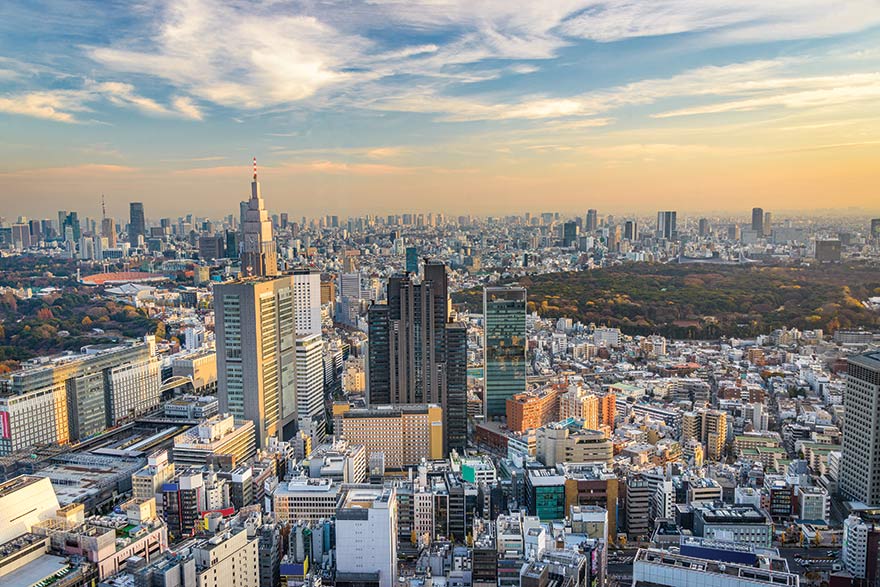There are often debates about the actual economic benefits of hosting an Olympic Games. The answer can often seem quite ambiguous, as it is often said the games value encompasses more than simply money
While this is certainly true, with Japan knowing more than others the positives of hosting an Olympics, the financial situations of the games can’t be merely overlooked. Recent games, such as the 2016 Rio Summer Games and the 2004 Athens Summer Games, are proof of this. If things are mismanaged and everything isn’t accounted for, the economic effects of hosting large scale events such as the Olympics can be felt throughout a country. However, positivity remains strong throughout the general public that Tokyo 2020 can yield much more economic gains than previous games. Lets take a look at just some of the factors that can help these games be more financially successful than games of the past.
This upcoming Summer Olympic and Paralympic Games is not the first try for the Japanese government when it comes to organising the summer games. Tokyo hosted them back in 1964, and at that time it was the most expensive Olympic Games to date, with a budget of roughly two billion USD. Despite the huge financial burden it placed on Japan, it is easy to see that the benefits far outweighed the negatives. This is because the 1964 Tokyo Games were not about simply making money, but rather changing the stigmatism and helping to create a new global identity for the country.
Tokyo 2020 is quite different, as the objective is less about changing negative feelings fostered towards Japan, as they aren’t so prevalent nowadays
Tokyo 2020 is quite different, as the objective is less about changing negative feelings fostered towards Japan, as they aren’t so prevalent nowadays. So the determination of the success of these games will be measured more by the financial aspects than its predecessor. When analysing whether this hope for a prosperous games has some basis, it is easy to see the source of optimism felt by many. This previous experience of hosting the world’s largest sporting event is extremely valuable to the planning committee, who can draw upon their predecessors’ knowledge to avoid problems.
PRE-EXISTING INFRASTRUCTURE
Pre-existing infrastructure is the obvious factor that is always cited as one of the most important determinants as to whether an Olympic Games will be economically successful or not. Sometimes the country’s organising committee starts from scratch, having to build a tonne of facilities and temporary transportation supplements. All of these are of course necessary to allow the smooth operating of the games, but they can often result in the likelihood of gaining money to be squandered early on.
Luckily for Tokyo, there are already a large amount of facilities and systems in place to accommodate many people. This is the natural result of having 38 million people residing in the city’s greater metropolitan area. The train system and subway systems are already extensively developed, with the ability to be built upon further. This, coupled with an influx of taxis flooding the city from other metropolitan areas and possibly buses, means that renovating transportation in the city shouldn’t be an overbearing cost on the Japanese government.
 The other thing the city has going for it are the venues built for the 1964 Games and in the following decades. There are 11 venues that will be used in Tokyo 2020 that weren’t built specifically for the games. These event venues have been named the “Heritage Zone”, and include Yoyogi Stadium, The Tokyo Metropolitan Gymnasium and The Japanese Budokan. This doesn’t also factor in the many venues that are supplied by multiple domestic professional sports leagues throughout Japan, most notably the J.League’s facilities. They will utilise the stadiums that house the top professional soccer teams in Japan, to host a variety of events at the games. These stadiums span from Sapporo to Yokohama. As opposed to having to build all of the necessary infrastructure, in many ways Tokyo can simply build on it’s pre-existing facilities.
The other thing the city has going for it are the venues built for the 1964 Games and in the following decades. There are 11 venues that will be used in Tokyo 2020 that weren’t built specifically for the games. These event venues have been named the “Heritage Zone”, and include Yoyogi Stadium, The Tokyo Metropolitan Gymnasium and The Japanese Budokan. This doesn’t also factor in the many venues that are supplied by multiple domestic professional sports leagues throughout Japan, most notably the J.League’s facilities. They will utilise the stadiums that house the top professional soccer teams in Japan, to host a variety of events at the games. These stadiums span from Sapporo to Yokohama. As opposed to having to build all of the necessary infrastructure, in many ways Tokyo can simply build on it’s pre-existing facilities.
Last year Japan saw a record breaking amount of tourists, with roughly 32 million arriving, a quarter of which were reportedly from China. The sheer proximity of Japan to the world’s most populated country, and relatively cheap flights between the two, allows for the emerging Chinese middle class to make the trip over to support their national team. While it may be true that China will host the upcoming 2022 Winter Olympic Games, it is undeniable that the popularity of the summer games tends to exceed it’s winter counterpart. It should also be taken into account the amount of Korean, Taiwanese and Southeast Asian visitors who will likely make the trip.
An issue that the previous 2016 Summer Games in Rio may have encountered was the relative inaccessibility it had from a large portion of the world’s population. The population of the Americas is generally estimated to be around a billion, less than that of the single country of China. We also need to compare flight times from India, which boasts the world’s second largest population, with 1.3 billion citizens.
For most games, amassing a billion dollars in domestic sponsorships is seen as a success. The Tokyo 2020 Games, however, have set a record by more than tripling the amount set by any previous games, with over $3 billion
It takes roughly 8 hours to fly directly from India to Japan, while it can take up to twice as long to get to Brazil. There is already a relatively large amount of Indian nationals living in Japan, and thus it may foster a positive image in the population back in India. With an Indian community already in place, it may be more enticing for family members to make a visit during Tokyo 2020. One could try to argue that a large portion of these countries’ populations live impoverished lives and have no means to actually make the trip, but it’s also important to note that both countries have a middle class that is roughly the size of the U.S. population.
Now this is somewhat of a difficult point to decipher the actual effect on determining if the games will be profitable. However, due the fact that this money is not directly taken from taxpayers, where things like pensions are a bigger concern, it needs to be noted as a benefit to the general public when compared to prior games. While this may not mean the businesses of Japan will be able to return the sheer capital they have invested, it does mean that the common citizen isn’t shouldering so much of the financial burden.
Yes, there are often many Olympic sponsors that play vital roles in helping the games in a variety of aspects, like media, marketing, etc. However, the actual amount of pure funds that is poured into the games isn’t all that much in the grand scheme of things. For most games, amassing a billion dollars in domestic sponsorships is seen as a success. The Tokyo 2020 Games, however, have set a record by more than tripling the amount set by any previous games, with over $3 billion.

While it is no secret that some Olympic Games have struggled to sell their tickets and thus end up in some instances giving them away for free, such a case doesn’t seem likely for Japan. There have already been two lottery events, where Japanese nationals were allowed to enter their name into a randomised algorithm that would select lucky individuals.
Following the first lottery draw in July, the results showed that 3.2 million tickets had already been sold, with less than 10% of the available tickets remaining unsold. This doesn’t include the fact that a secondary lottery was open to the public in August and that international sales have yet to open. A total of roughly seven million tickets are available, with many indicators pointing to upwards of six million being sold. Compare this to Rio 2016, which only sold 4.8 million mere days before the opening of the Olympics.
This high demand also ensures ticket prices are higher than those of previous games, though they roughly fall in line with those of London 2012. Ticket prices range from about $20 to over $1,700, which would make the premier tickets more expensive than any at the 2012 games. Half the tickets are still reasonably priced, with the majority being available for roughly $75.
USE OF THE FACILITIES AFTER THE OLYMPICS
One issue that always seems to plague the countries who host the Olympics is what to do with the facilities after the games are finished. This is a major concern for many taxpayers in Japan. This final point is related to the previous point made in this article, raising the question of whether the facilities are worth it in the long term?
We can see the remains of many previous Olympic facilities somewhat rotting away due to little use. The 2004 Athens Summer Games comes to mind. It is reported that out of the 22 venues constructed, only one is still in use. However, other countries have been able to better utilise newly built structures, such as London. The venues are seemingly in constant use for events and have helped make the area more trendy.

Luckily, there are some plans to be implemented post-Tokyo 2020. These seem to fall in line with those of the UK. If we look at the “Legacy Venues” left from 1964, we can see what kind of plan they will have moving forward, but hopefully on a much more drawn out plan. The Tokyo Metropolitan Gymnasium and Yoyogi Arena have hosted happenings raning from international sporting events, to pop concerts, to even much smaller local hobby events. Some facilities are used for everyday use by the general public. Tokyo Tatsumi International Swimming Centre is constantly open for public use, from children’s lessons to free swim sessions. If they are able to effectively make these venues points of emphasis in their communities, then long term benefits can be reaped.
The Games’ organisers issued an updated budget that shows $12.6 billion in costs to them and other entities.
However, in a separate report, the Board of Audit of Japan identified billions more in expenditures by municipal and national governments that were not included in the Tokyo 2020 ledgers.
Organisers insisted they shouldn’t be held responsible for the additional money.
“As in the previous year, their report did not classify the cost of these items and activities based on their direct relevance to the Games,” Tokyo 2020 told Associated Press.
“It aggregated a wide range of projects that could be seen as contributing to the Games, including those that were implemented without regard to the Games.”
Various calculations by Japanese media have placed overall spending between $26 billion and $28 billion, more than tripling the cost officials predicted when the International Olympic Committee selected the Japanese capital as host in the autumn of 2013.
Various calculations by Japanese media have placed overall spending between $26 billion and $28 billion, more than tripling the cost officials predicted when the International Olympic Committee selected the Japanese capital as host in the autumn of 2013
By comparison, the most recent budget for L.A. 2028 stands at $6.9 billion — about $700 million more than originally forecast — with nine years to go before those Games. Organisers have said that they can minimise costs by using existing stadiums and arenas, such as the Coliseum and Staples Center.
Japan has built numerous venues for the 2020 Summer Games, including an expensive national stadium and athletes village. In their updated budget, organisers noted a $300-million increase in expected revenue, saying they expect to generate $5.9 billion, which would cover the direct spending that they’ve projected.
Sponsorship sales have gone especially well, totalling $3.3 billion. Public demand has also been strong, with ticket requests far outpacing availability and Tokyo 2020 holding additional lotteries.
It will be interesting to see just how all of this eventually plays out. Hosting such massive events can be unpredictable, with many unforeseen factors coming into play. It will be incredibly important for the Tokyo 2020 Organising Committee and the Japanese government to be on the same page to fully utilise all the positive factors these upcoming Summer Games could provide.